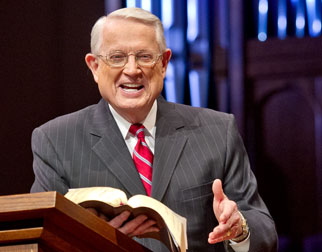
Listen to Chuck Swindoll’s overview of Zephaniah in his audio message from the Classic series God’s Masterwork.
Who wrote the book?
In Zephaniah 1:1, the author introduces himself as “Zephaniah son of Cushi, son of Gedaliah, son of Amariah, son of Hezekiah.” Among the prophets, this is a unique introduction with its long list of fathers back to Zephaniah’s great-great grandfather, Hezekiah. So why stop with Hezekiah? Most likely, the prophet wanted to highlight his royal lineage as a descendant of one of Judah’s good kings. The reference to “this place” in Zephaniah 1:4 indicates that he prophesied in Jerusalem, while his many references to temple worship display a strong familiarity with Israel’s religious culture. All these factors paint the picture of a man who was at the center of Judah’s political and religious world, a man whose close proximity to those in power would have given his shocking message an even greater impact.
Where are we?
The book tells us that Zephaniah prophesied during the reign of Josiah, the king of Judah from 640 to 609 BC (Zephaniah 1:1). We can begin to pinpoint exactly when Zephaniah prophesied by accounting for a few details in the text. First, in 2:13 the prophet predicted the fall of Nineveh, an event which occurred in 612 BC. Further, Zephaniah made frequent quotations from the Law (for example, compare 1:13 to Deuteronomy 28:30, 39), a document that remained lost in Judah for much of Josiah’s reign. Therefore, Zephaniah more than likely prophesied in the latter part of Josiah’s rule, after the king discovered the scrolls of the Law in 622 BC (2 Chronicles 34:3–7).
This all means that Zephaniah grew up under the reign of Josiah’s predecessors: Josiah’s grandfather, the evil king Manasseh, and Manasseh’s son, the young and evil Amon. As a young man, the prophet-to-be would have been surrounded by the trappings of idolatry, child sacrifice, and unjust killings—strong influences on a young mind (2 Kings 21:16; 2 Chronicles 33:1–10). But Zephaniah grew into a man of God, able to stand before the people and proclaim God’s message of judgment and hope to a people that had gone astray.
Why is Zephaniah so important?
This book mentions the day of the Lord more than does any other book in the Old Testament, clarifying the picture of Judah’s fall to Babylon and the eventual judgment and restoration of all humanity in the future. In this case, it refers primarily to God’s impending time of judgment on the nation of Judah. Zephaniah saw in the day of the Lord the destruction of his country, his neighbors, and eventually the whole earth (Zephaniah 1:2, 4; 2:10). Zephaniah wrote that the day of the Lord was near (1:14), that it would be a time of wrath (1:15), that it would come as judgment on sin (1:17), and that ultimately it would result in the blessing of God’s presence among His people (3:17).
What’s the big idea?
Like the writings of many of the prophets, the book of Zephaniah follows a pattern of judgment on all people for their sin followed by the restoration of God’s chosen people. Zephaniah’s primary target for God’s message of judgment, the nation of Judah, had fallen into grievous sin under the reign of their king, Manasseh. Zephaniah’s prophecy shouted out for godliness and purity in a nation sinful to its core. The people of Judah had long since turned their backs on God, not only in their personal lives but also in their worship. This reflected the depth of their sin and the deep need for God’s people to be purged on their path to restoration.
How do I apply this?
Those living in Judah had turned the worship of God into a fiasco. Not only had they built their own places of worship to revere other gods (called “high places” in the Old Testament), but they had begun to desecrate the temple, which at that time was the dwelling place of God (Zephaniah 1:9).
As modern-day believers in Christ, we, too, make a mockery of worship when we live in open sin. Do you come before the Lord with a false face, week in and week out, looking the part without acting it? Allow Zephaniah to remind you how seriously God takes your life and your relationship with Him. And if you have failed, remember the message of Zephaniah 3—God is always a God of restoration and hope.
Copyright ©️ 2009 by Charles R. Swindoll, Inc. All rights reserved worldwide.
About the Author
 Pastor Chuck Swindoll
Pastor Chuck Swindoll
Pastor Charles R. Swindoll has devoted his life to the accurate, practical teaching and application of God’s Word. He is the founding pastor of Stonebriar Community Church in Frisco, Texas, but Chuck’s listening audience extends far beyond a local church body. As a leading program in Christian broadcasting since 1979, Insight for Living airs around the world. Chuck’s leadership as president and now chancellor emeritus at Dallas Theological Seminary has helped prepare and equip a new generation of men and women for ministry.
